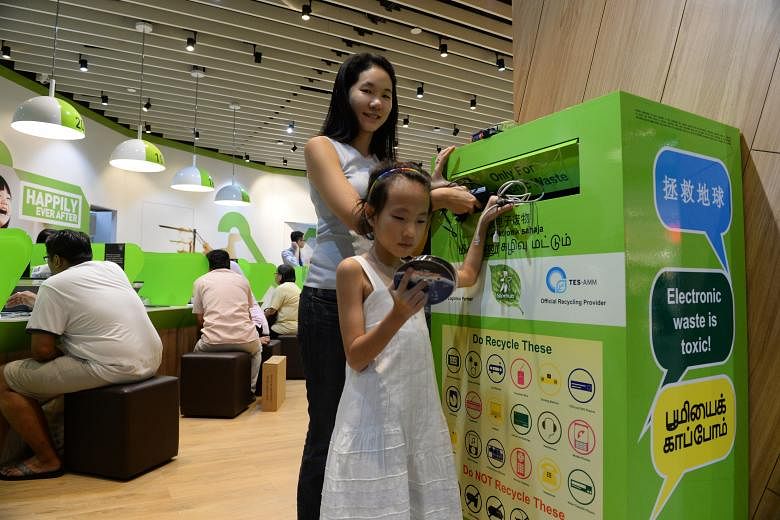With residents here getting rid of their old laptops and cellphones without a second thought, Singapore is churning out 60 million kg of electronic waste (e-waste) every year - more than the combined weight of 220 Airbus A-380 aircraft. Only a fraction of that is recycled or disposed of properly.
So far, the most extensive community e-waste recycling programme here has managed to collect only 22,000kg of it from 214 recycling bins islandwide this year. That is less than the weight of two buses.
The project is managed by StarHub, DHL Express and home- grown recycling firm TES-AMM.
The South East Community Development Council (CDC) restarted its heartland e-waste recycling programme in February after a pilot in 2013 collected 10,000kg of items.
That is why the National Environment Agency (NEA) is studying the option of having a regulated national system to collect, recycle and manage e-waste .
The study will review the laws and enforcement frameworks in place in other countries that require consumers to recycle and dispose of e-waste separately for "potential application" here.
In the NEA tender that was called last month, it wanted a survey to be done of the entire e-waste collection and recycling value chain.
In the tender document, it said: "The amount of e-waste is rising with today's ubiquitous use of computers, smartphones and other equipment. E-waste contains substances that may lead to adverse health impact and environmental degradation when improperly collected and treated."
E-waste contains valuable and scarce materials, but also small amounts of hazardous substances such as mercury and cadmium.
Currently, used electrical and electronic equipment is mostly taken away by second-hand dealers to be scrapped or refurbished. Some manufacturers also run schemes to take back used IT equipment.
"However, recycling avenues for some types of equipment, such as bulky consumer electronics and home appliances, are few and far between," NEA told The Straits Times last week. "A more comprehensive system needs to be established."
The agency has been meeting companies, manufacturers, retailers and recycling service providers to set up more recycling points for the public, raise recycling standards and collect data to come up with a regulated management system.
The project led by StarHub started in 2012 with 2,700kg of e-waste collected from five bins. By the end of the year, there will be 235 bins located in offices, schools and shopping malls islandwide.
"The project is not yet self-sustaining. For instance, the cost of collection is about $3,000, double the returns from recycled materials," said a StarHub spokesman.
Other challenges in the way of e-waste recycling taking off in a big way here include a lack of awareness. "Typically, people either trade in their unwanted e-waste during electronic fairs, sell it off to karung guni or treat it as general waste because of the convenience or lack of awareness of recycling platforms," said a spokesman for South East CDC.
Its 2013 pilot partnered Panasonic Asia Pacific, which donated energy-saving light bulbs to less-privileged families in Marine Parade and Mountbatten based on the amount of recyclables collected.
Ms Bernadette Ng, 37, has donated an iPad, old remote controls, CDs and cables over the last few years. "I started to donate when there was a recycling bin at the Kembangan Community Club near my home and I always do it with my children to show them the importance of caring for our environment," said Ms Ng, who works in the aviation industry.
"It must be consistently practised so that it becomes part of our daily behaviour."


